频度副词(1)
- 格式:docx
- 大小:19.35 KB
- 文档页数:6
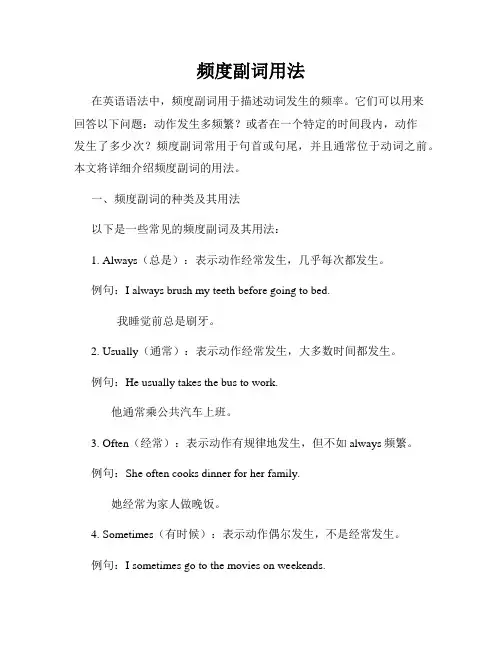
频度副词用法在英语语法中,频度副词用于描述动词发生的频率。
它们可以用来回答以下问题:动作发生多频繁?或者在一个特定的时间段内,动作发生了多少次?频度副词常用于句首或句尾,并且通常位于动词之前。
本文将详细介绍频度副词的用法。
一、频度副词的种类及其用法以下是一些常见的频度副词及其用法:1. Always(总是):表示动作经常发生,几乎每次都发生。
例句:I always brush my teeth before going to bed.我睡觉前总是刷牙。
2. Usually(通常):表示动作经常发生,大多数时间都发生。
例句:He usually takes the bus to work.他通常乘公共汽车上班。
3. Often(经常):表示动作有规律地发生,但不如always频繁。
例句:She often cooks dinner for her family.她经常为家人做晚饭。
4. Sometimes(有时候):表示动作偶尔发生,不是经常发生。
例句:I sometimes go to the movies on weekends.我有时候在周末去看电影。
5. Rarely(很少):表示动作发生的频率非常低,几乎不发生。
例句:They rarely go on vacation.他们很少去度假。
6. Never(从不):表示动作从未发生过。
例句:I never eat fast food.我从不吃快餐。
二、频度副词的位置频度副词通常放在一般动词前面,但放在助动词、情态动词或be 动词之后。
例句:I always wake up early.我总是早起。
She can rarely finish her homework on time.她几乎从不能按时完成作业。
对于句子的否定形式,频度副词通常放在助动词之后,但在be动词之前。
例句:He is never late for work.他上班从不迟到。
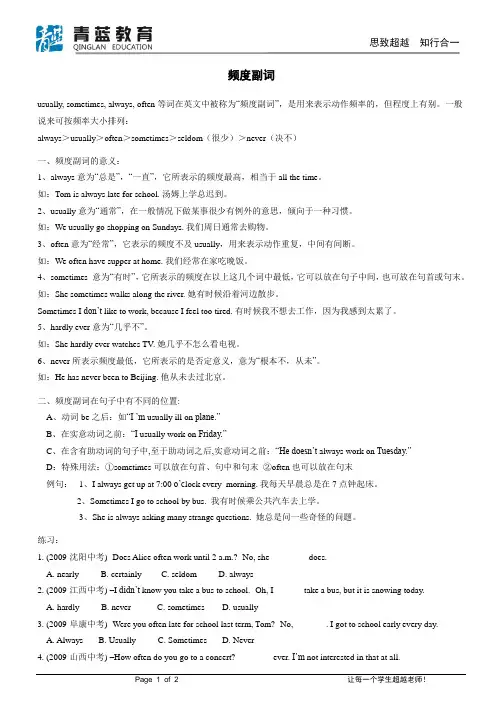
频度副词usually, sometimes, always, often等词在英文中被称为“频度副词”,是用来表示动作频率的,但程度上有别。
一般说来可按频率大小排列:always>usually>often>sometimes>seldom(很少)>never(决不)一、频度副词的意义:1、always 意为“总是”,“一直”,它所表示的频度最高,相当于 all the time。
如:Tom is always late for school. 汤姆上学总迟到。
2、usually意为“通常”,在一般情况下做某事很少有例外的意思,倾向于一种习惯。
如:We usually go shopping on Sundays. 我们周日通常去购物。
3、often 意为“经常”,它表示的频度不及usually,用来表示动作重复,中间有间断。
如:We often have supper at home. 我们经常在家吃晚饭。
4、sometimes 意为“有时”,它所表示的频度在以上这几个词中最低,它可以放在句子中间,也可放在句首或句末。
如:She sometimes walks along the river. 她有时候沿着河边散步。
Sometimes I don’t like to work, because I feel too tired. 有时候我不想去工作,因为我感到太累了。
5、hardly ever 意为“几乎不”。
如:She hardly ever watches TV. 她几乎不怎么看电视。
6、never 所表示频度最低,它所表示的是否定意义,意为“根本不,从未”。
如:He has never been to Beijing. 他从未去过北京。
二、频度副词在句子中有不同的位置:A、动词be 之后:如“I’m usually ill on plane.”B、在实意动词之前:“I usually work on Friday.”C、在含有助动词的句子中,至于助动词之后,实意动词之前:“He doesn’t always work on Tuesday.”D:特殊用法:①sometimes可以放在句首、句中和句末②often 也可以放在句末例句: 1、I always get up at 7:00 o’c lock every morning. 我每天早晨总是在7点钟起床。
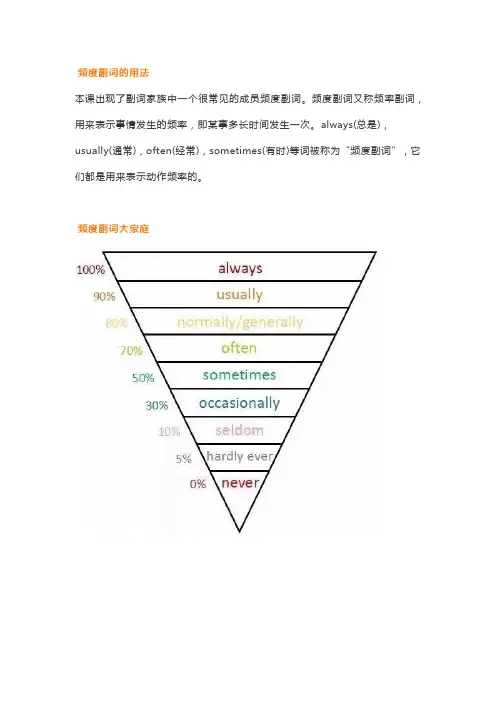
频度副词的用法本课出现了副词家族中一个很常见的成员频度副词。
频度副词又称频率副词,用来表示事情发生的频率,即某事多长时间发生一次。
always(总是),usually(通常),often(经常),sometimes(有时)等词被称为“频度副词”,它们都是用来表示动作频率的。
频度副词大家庭使用频度副词要注意以下几点:(1)表示频度方面的区别。
①always是频度最高的词,意为“总是”。
例如: I always get up at6:30. 我总是在6:30起床。
②usually意为“通常”,即很少例外,频度仅次于always.例如: What do you usually have for breakfast? 你早饭通常吃什么?③often 意为“经常", 不如usually那么频繁。
例如: Li Ping often does his homework in the afternoon.李平经常在下午做家庭作业。
sometimes 意为“有时”,频度比fen低,表示动作偶尔发生,间隔较大。
例如: I sometimes go to the library. 我有时去图书馆。
(2)频度副词在句中的位置。
①频度副词在句中习惯上位于be动词、助动词之后,行为动词之前。
例如: She is often late for school. 她上学经常迟到。
When do you usually get up in the morning? 你早上通常什么时候起床? He usually goes to bed at about 12. 他通常大约(午夜)十二点睡觉。
②sometimes 是一个特殊的频度副词,既可以放在be动词、助动词之后,行为动词之前;也可以放在句首;还可以放在句尾。
例如:I walk to school sometimes. 我有时步行去学校。
Sometimes I help my mother with the housework. 我有时帮助妈妈做家务。
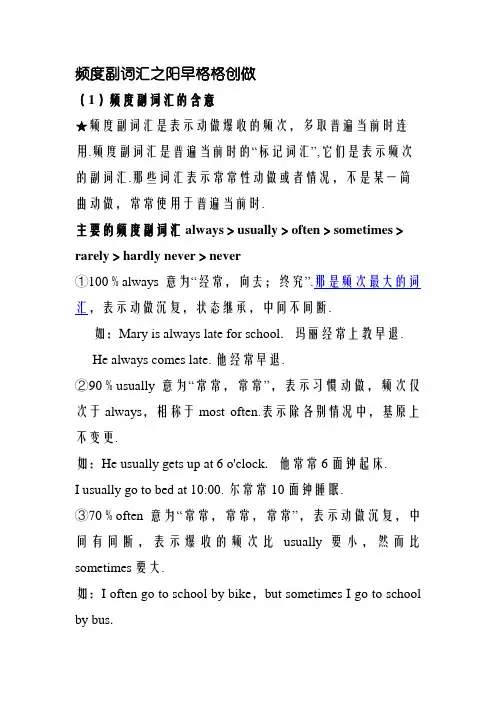
频度副词汇之阳早格格创做(1)频度副词汇的含意★频度副词汇是表示动做爆收的频次,多取普遍当前时连用.频度副词汇是普遍当前时的“标记词汇”,它们是表示频次的副词汇.那些词汇表示常常性动做或者情况,不是某一简曲动做,常常使用于普遍当前时.主要的频度副词汇always>usually>often>sometimes>rarely>hardly never>never①100﹪always意为“经常,向去;终究”.那是频次最大的词汇,表示动做沉复,状态继承,中间不间断.如:Mary is always late for school.玛丽经常上教早退.He always comes late. 他经常早退.②90﹪usually意为“常常,常常”,表示习惯动做,频次仅次于always,相称于most often.表示除各别情况中,基原上不变更.如:He usually gets up at 6 o'clock.他常常6面钟起床.I usually go to bed at 10:00. 尔常常10面钟睡眠.③70﹪often意为“常常,常常,常常”,表示动做沉复,中间有间断,表示爆收的频次比usually要小,然而比sometimes要大.如:I often go to school by bike,but sometimes I go to school by bus.尔常常骑自止车上教,然而偶尔乘公同汽车去.They often clean the classroom after school. 他们常常正在搁教后挨扫课堂.④40﹪sometimes意为“偶尔”,表示爆收的频次比较小.sometimes一词汇正在书籍写时要格中留神,若分启写成some times便成了“佳频频,数次”.sometimes的位子较为机动,可位于句尾、句中或者句终. 如:They are always late for school. 他们经常上教早退.He has never been there. 他从去出去过何处.Sometimes Tony goes to school by bike. 托僧偶尔骑自止车去上教.He has lunch in the factory sometimes.他偶尔正在工厂吃午饭.We sometimes go skiing in winter. 冬天咱们偶尔去滑雪.I read this story some times.那个故事尔读过佳频频了.⑤ 20﹪ rarely表示爆收的频次很稠密.We have rarely seen such a beautiful sunset.咱们很少瞅睹那样优好的夕阳⑥5﹪hardly ever 表示“险些从不;很少;罕见”.=almost never或者very seldom,相称于百分之几或者0%的频次. 如:He hardly ever goes to bed before nine o’clock.⑦never=at no time或者not ever表示“永不,从已”之意,相称于0%的频次.位子比较机动,不妨搁正在句尾.比方:Never have I seen such a strange looking man. 尔从去出睹过少相那样怪的人表示简曲的频次,次数时,一次用once,二次用twice,三次及以上用“基数词汇+times”表示I play soccer twice a week.She watches TV for times a week.【追踪训练】1.经常,向去()2.常常()3.常常()4.偶尔()5.险些不()6.从不()1. He ____ goes to bed too late, because he has to get up early every day.A. alwaysB. neverC. usuallyD. sometimes2. She always finishes her homework on time. She ____ leaves it for tomorrow.A. alwaysB. neverC. usuallyD. sometimes3.—I didn’t know you take a bus to school.—Oh, I ______ take a bus, but it is snowing today.A. hardlyB. neverC. sometimesD. usually4. How often do you go to a concert?_______ ever. I’m not interested in that at all.A. UsuallyB. HardlyC. Almost(2)频度副词汇的位子①频度副词汇普遍搁正在真义动词汇之前,be动词汇、帮动词汇或者情态动词汇之后We never eat junk(垃圾) food.Lucy is sometimes very busy.I can hardly say a word.②sometimes是个特殊的频度副词汇,既不妨搁正在be动词汇、帮动词汇之后,止为动词汇之前,也不妨搁正在句尾,还不妨搁正在句尾.如:I sometimes think that it is a great mistake.尔偶尔念那是一个大错.Sometimes I help my mother in the house.偶尔间尔帮闲妈妈干家务.③often不妨搁正在句中,也可搁正在句尾We have been there quite often.咱们常常到那女去.often用于句尾常常常表示强调,且其前里普遍有quiet,very建饰Very often he goes online. 他上钩很常常④usually偶尔也搁于句尾,其前不必建饰语Usually my father gets up early. 尔爸爸常常起床很早⑤always普遍不必于句尾,然而是正在祈使句中不妨Always remember this. 请时刻记着那面【随堂训练】一.把句子挖写完备1. You forgot to do your homework. (rarely) 您险些记记了干您的做业.2. He gets up at 6 o’clock every morning.(never)他每天早朝从去不正在六面钟起床.3. We have seen such a beautiful sunset. (rarely)咱们很少瞅到如许优好的日降.4. She is on time.( never) 她从去不守时.5. Your grandparents go out for a walk. (hardly)您的爷爷奶奶险些不进去集步.6. The sun rises in the west. (never) 太阳从去不正在西边降起. (3)对于频度副词汇的提问对于频次副词汇提问通常常使用how often那一短语,意为“多暂一次”.例子1 Li Ming usually does his homework after supper. (对于划线部分提问) How often does Li Ming do his homework after supper? 例子2We go to the cinema sometimes.(对于划线部分提问) How often do you go to the cinema?【概括尝试】一,采用题1.—How often does your sister surf the Internet?—About( .)A. three timeB. three timesC. three time every dayD. three times a day2.—()does it take you to watch TV?—About forty minutes.A. How longB. How muchC. How oftenD. How many3.—Were you often late for school last term, Tom?—No, _______. I got to school early every day.A. AlwaysB. UsuallyC. SometimesD. Never4.—John sings so well. Has he ever been trained?—No. He learns all by himself. He ________ goes to any training class.A. usuallyB. oftenC. neverD. even5.—Miss Gao is very popular with her students.—Yes. Her classes are ______ lively and interesting.A. seldomB. neverC. sometimesD. always6.—_____do you go to the bookstore?—Once a month.A.How oftenB.How many timesC.How manyD.How long7.—Oh,my God!I can______put on my trousers.—You must be getting fat.二、翻译1.大普遍教死每周锻炼三四次.Most students exercise ____ _____ _____ _____ _____ _____.2.他一周回家三次.He goes home ______ _______a week.。
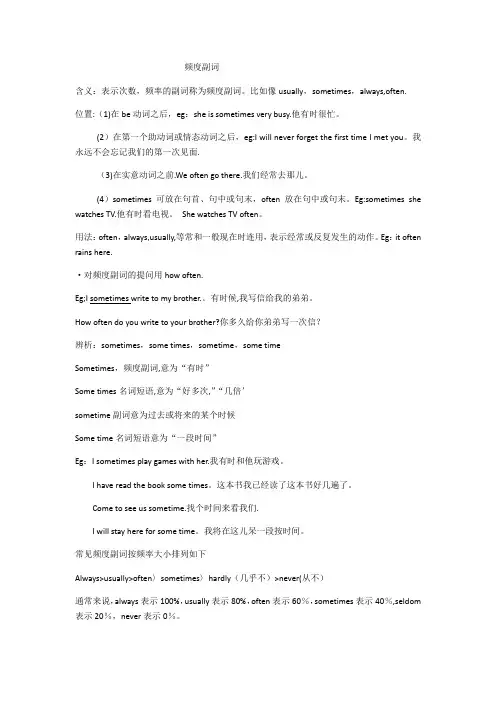
频度副词含义:表示次数,频率的副词称为频度副词。
比如像usually,sometimes,always,often.位置:(1)在be动词之后,eg:she is sometimes very busy.他有时很忙。
(2)在第一个助动词或情态动词之后,eg:I will never forget the first time I met you。
我永远不会忘记我们的第一次见面.(3)在实意动词之前.We often go there.我们经常去那儿。
(4)sometimes可放在句首、句中或句末,often放在句中或句末。
Eg:sometimes she watches TV.他有时看电视。
She watches TV often。
用法:often,always,usually,等常和一般现在时连用,表示经常或反复发生的动作。
Eg:it often rains here.·对频度副词的提问用how often.Eg;I sometimes write to my brother.。
有时候,我写信给我的弟弟。
How often do you write to your brother?你多久给你弟弟写一次信?辨析:sometimes,some times,sometime,some timeSometimes,频度副词,意为“有时”Some times名词短语,意为“好多次,”“几倍’sometime副词意为过去或将来的某个时候Some time名词短语意为“一段时间”Eg:I sometimes play games with her.我有时和他玩游戏。
I have read the book some times。
这本书我已经读了这本书好几遍了。
Come to see us sometime.找个时间来看我们.I will stay here for some time。
我将在这儿呆一段按时间。

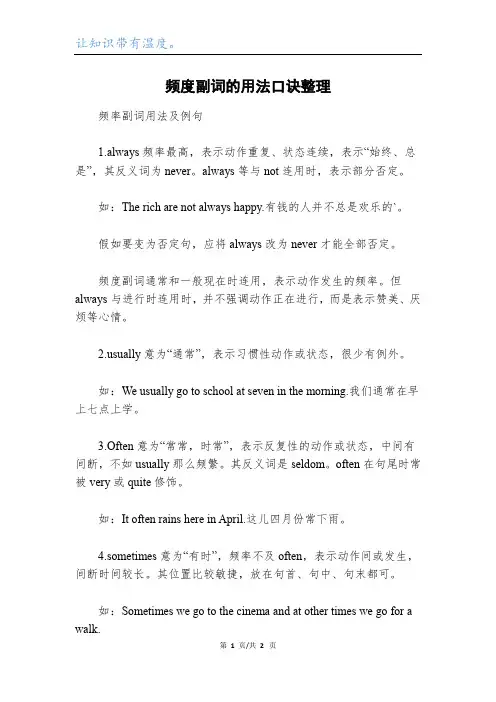
让知识带有温度。
频度副词的用法口诀整理频率副词用法及例句1.always频率最高,表示动作重复、状态连续,表示“始终、总是”,其反义词为never。
always等与not连用时,表示部分否定。
如:The rich are not always happy.有钱的人并不总是欢乐的`。
假如要变为否定句,应将always改为never才能全部否定。
频度副词通常和一般现在时连用,表示动作发生的频率。
但always与进行时连用时,并不强调动作正在进行,而是表示赞美、厌烦等心情。
ually意为“通常”,表示习惯性动作或状态,很少有例外。
如:We usually go to school at seven in the morning.我们通常在早上七点上学。
3.Often意为“常常,时常”,表示反复性的动作或状态,中间有间断,不如usually那么频繁。
其反义词是seldom。
often在句尾时常被very或quite修饰。
如:It often rains here in April.这儿四月份常下雨。
4.sometimes意为“有时”,频率不及often,表示动作间或发生,间断时间较长。
其位置比较敏捷,放在句首、句中、句末都可。
如:Sometimes we go to the cinema and at other times we go for a walk.第1页/共2页千里之行,始于足下。
有时我们去看电影,有时我们去漫步。
5.seldom意为“很少”,这个副词表示否定意义,动作几乎不会发生。
如:He seldom eats breakfast.他很少吃早餐。
hardly具有否定意义,表示“几乎不、简直不”,除非特别状况,否则不会发生。
如:The boy is so young that he could hardly understand it.这个孩子太小了,不行能懂得这件事。
6.never意为“从不”表示动作不会发生。
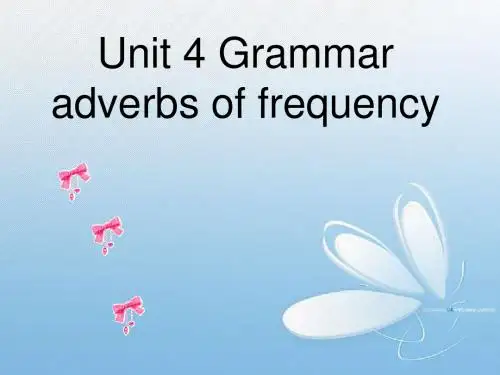
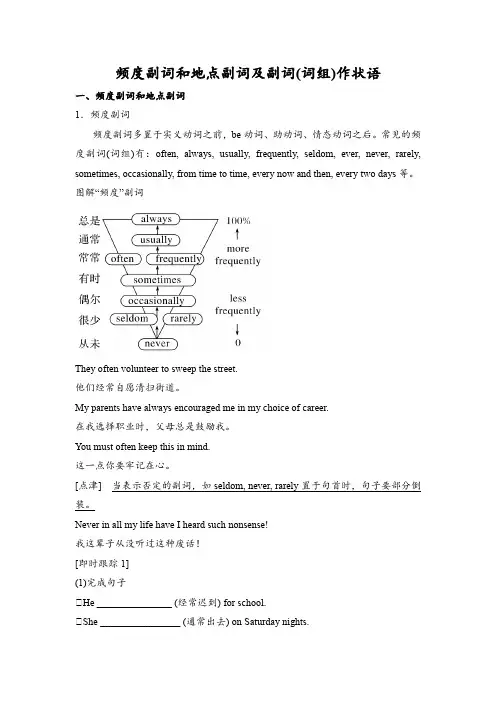
频度副词和地点副词及副词(词组)作状语一、频度副词和地点副词1.频度副词频度副词多置于实义动词之前,be动词、助动词、情态动词之后。
常见的频度副词(词组)有:often, always, usually, frequently, seldom, ever, never, rarely, sometimes, occasionally, from time to time, every now and then, every two days等。
图解“频度”副词They often volunteer to sweep the street.他们经常自愿清扫街道。
My parents have always encouraged me in my choice of career.在我选择职业时,父母总是鼓励我。
You must often keep this in mind.这一点你要牢记在心。
[点津]当表示否定的副词,如seldom, never, rarely置于句首时,句子要部分倒装。
Never in all my life have I heard such nonsense!我这辈子从没听过这种废话完成句子①He _______________ (经常迟到) for school.②She ________________ (通常出去) on Saturday nights.③My uncle _________________ (将永远不会忘记) what happened to him yesterday.(2)句型转换①I have never seen such a moving film.→Never _____________ such a moving film.②He seldom goes to see a film.→Seldom ___________ to see a film.2.地点副词地点副词通常放在句尾,也可放在句首、句中。
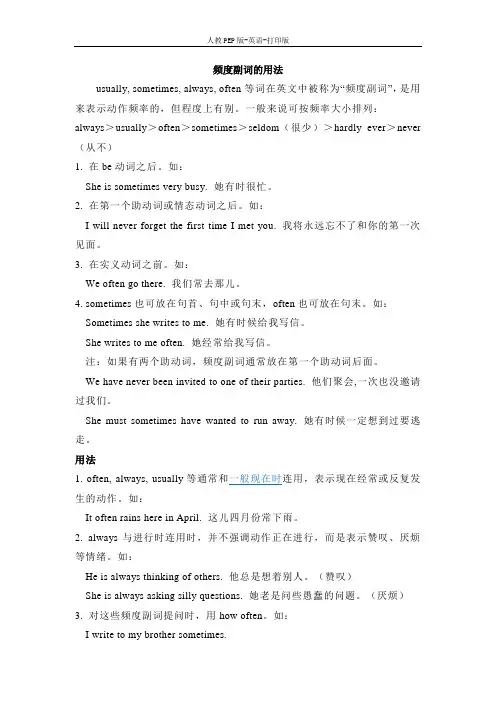
频度副词的用法usually, sometimes, always, often等词在英文中被称为“频度副词”,是用来表示动作频率的,但程度上有别。
一般来说可按频率大小排列:always>usually>often>sometimes>seldom(很少)>hardly ever>never (从不)1. 在be动词之后。
如:She is sometimes very busy. 她有时很忙。
2. 在第一个助动词或情态动词之后。
如:I will never forget the first time I met you. 我将永远忘不了和你的第一次见面。
3. 在实义动词之前。
如:We often go there. 我们常去那儿。
4. sometimes也可放在句首、句中或句末,often也可放在句末。
如:Sometimes she writes to me. 她有时候给我写信。
She writes to me often. 她经常给我写信。
注:如果有两个助动词,频度副词通常放在第一个助动词后面。
We have never been invited to one of their parties. 他们聚会,一次也没邀请过我们。
She must sometimes have wanted to run away. 她有时候一定想到过要逃走。
用法1. often, always, usually等通常和一般现在时连用,表示现在经常或反复发生的动作。
如:It often rains here in April. 这儿四月份常下雨。
2. always与进行时连用时,并不强调动作正在进行,而是表示赞叹、厌烦等情绪。
如:He is always thinking of others. 他总是想着别人。
(赞叹)She is always asking silly questions. 她老是问些愚蠢的问题。
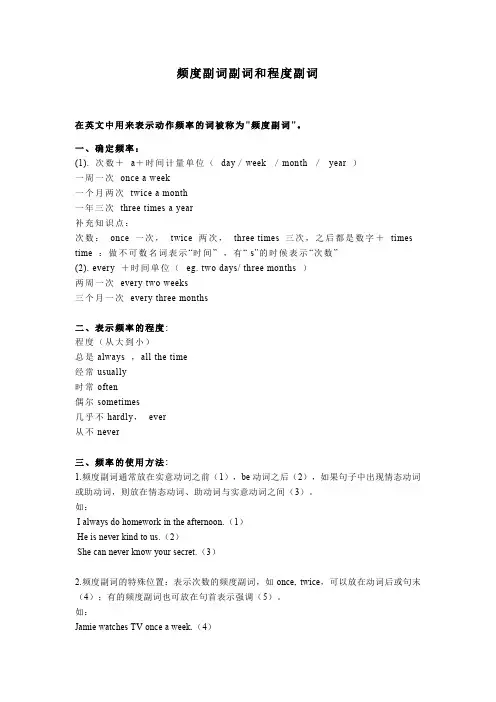
频度副词副词和程度副词在英文中用来表示动作频率的词被称为"频度副词"。
一、确定频率:(1). 次数+a+时间计量单位(day/week /month /year )一周一次once a week一个月两次twice a month一年三次three times a year补充知识点:次数:once 一次,twice 两次,three times 三次,之后都是数字+times time :做不可数名词表示“时间” ,有“ s”的时候表示“次数”(2). every +时间单位(eg. two days/ three months )两周一次every two weeks三个月一次every three months二、表示频率的程度:程度(从大到小)总是always ,all the time经常usually时常often偶尔sometimes几乎不hardly,ever从不never三、频率的使用方法:1.频度副词通常放在实意动词之前(1),be动词之后(2),如果句子中出现情态动词或助动词,则放在情态动词、助动词与实意动词之间(3)。
如:I always do homework in the afternoon.(1)He is never kind to us.(2)She can never know your secret.(3)2.频度副词的特殊位置:表示次数的频度副词,如once, twice,可以放在动词后或句末(4);有的频度副词也可放在句首表示强调(5)。
如:Jamie watches TV once a week.(4)The car broke down twice.(4)Sometimes I go fishing with my dad.(5)四、询问事情发生的频率1)询问事情发生频率的特殊疑问词是:How oftenHow often +do (助动词)+要询问的事How often do you go to library?2)助动词do 要根据时态和人称进行变化:三单:how often does ⋯How often does he visit you?过去时:how often did ⋯How often did you come back home?将来时:how often will ⋯How often will you go to gym?程度副词的用法1. 程度副词用语表示程度,常用频度副词有:almost 几乎;enough 足够;fairly 相当;greatly 十分;hardly 几乎不;much 十分;nearly 几乎;pretty 相当;quite相当;rather 相当;really 的确;too 太;very 很;如果去掉其中的程度副词,看出他们的意义有什么变化吗?I hardly knew him.我简直不认识他。
高中英语语法频度副词语法点讲解1.意义:表示动作发生的次数、频率的副词。
always, sometimes, never,usually,often ...常用频度副词的频率排序:always 100%usually 90%normally 80%often 70%sometimes 50%occasionally 30%seldom 20%hardly ever 5%never 0%2. 频度副词出现的位置(用法):1.频度副词通常放在实意动词之前(1),be动词之后(2),如果句子中出现情态动词或助动词,则放在情态动词、助动词与实意动词之间(3)。
如:I always do homework in the afternoon.(1)He is never kind to us.(2)She can never know your secret.(3)2.频度副词的特殊位置:表示次数的频度副词,如once, twice,可以放在动词后或句末(4);有的频度副词也可放在句首表示强调(5)。
如:The car broke down twice.(4)Sometimes I go fishing with my dad.(5)3. 常用频度副词精讲:1. always 频率最高,表示动作重复、状态继续,表示“一直、总是”,其反义词为never。
always等与not连用时,表示部分否定。
如:The rich are not always happy. 有钱的人并不总是快乐的。
如果要变为否定句,应将always改为never才能全部否定。
如:Li Ping is always late for school. 李平上学总是迟到。
Li Ping is never late for school.(全部否定)Li Ping is not always late for school. (部分否定)频度副词通常和一般现在时连用,表示动作发生的频率。
中考英语频度副词考点归纳
中考英语频度副词的考点主要涉及对频度副词的理解和正确使用。
以下是中考英语中频度副词的考点归纳:
1. 频度副词的位置:频度副词通常放在连系动词、助动词或情态动词的后面,如“David is often arrives late for school.”(大卫上学经常迟到)。
频
度副词也可以放在行为动词之前,如“We usually go to school at 7:10 every day.”(我们每天经常在7:10去上学)。
有些频度副词可以放在句
首或句尾,用来表示强调,如“Sometimes I walk home, sometime I
ride a bike.”(有时我步行回家,有时我骑自行车)。
2. 常见频度副词:always(总是,一直)、usually(通常)、often(常常,经常)、sometimes(有时候)、never(从不)。
3. 注意事项:当“never”放在句首时,主语和谓语动词需要倒装,如“Never have I been there.”(我从没到过那儿)。
此外,还需要注意频度副词与时间状语的区别,如“always”与“forever”在语义和用法上的区别。
同时,对于一些易混淆的频度副词,如“always”与“never”,“usually”与“seldom”,需要特别注意其用法和含义。
以上归纳仅供参考,建议查阅教辅材料或咨询英语老师获取更准确的信息。
语法;频度副词1.频度副词的定义:用来表示动作频率的副词。
usually , always , sometimes , often 等都叫频率副词,但它们在程度上有区别,一般来说可按频率大小排列如下:always (100%)>usually>often >sometimes>hardly ever>never (0%)2.频度副词的位置:通常放在实义动词之前,be 动词,助动词或情态动词之后。
e.g. We often go there. ( 我们常去那儿。
)e.g. She is sometimes very busy. ( 她有时很忙。
)e.g. I will never forget the first time I met you. (我永远忘不了和你的第一次见面。
)(另外,sometimes 可放在句首、句中或句末,often也可放在句末。
)e.g. Sometimes she writes to me .( 她有时候给我写信。
)e.g. She writes to me often.( 她经常给我写信。
)3.频度副词的用法:(1)often , usually , always , sometimes等通常和一般现在时连用,表示现在经常或反复发生的动作。
e.g. He often watches TV.(2)对这些频度副词提问用“how often”。
另外,区别疑问词组“how often”(“多久一次”),“how many times”(“多少次”), “how long”(“多久”),“how soon”(“多久之后”)的用法。
1.“how often”(多久一次),用来提问做事的频率。
针对“how often”的回答一般是表频率的副词(如;always , often , usually , sometimes ,hardly ever , never 等)或表频率的短语( 如:every day , every morning , twice a year , three times a week , once a month 等)e.g. –How often do you watch TV? –Three times a week.2.“how many times”也可询问“多少次”,其答语表示次数,常为once , twice , three times等。
更多>> always usually often sometimes hardly ever ne ver 频度副词的用法一、频度副词的概念与用法频度副词是指表示动作发生的次数副词,常见有的never, seldom, sometimes, frequently, often, usually, always 等。
频度副词通常位于实义动词之前,动词be、助动词、情态动词等之后。
如:We often get together.我们常常聚会。
Jane usually goes to work by bike.简通常骑自行车上班。
He sometimes goes there on business.他有时到那里出差。
He can never understand.他永远也不会明白的。
I shall always remember this.我将永远记住这一点。
注:如果有两个助动词,频度副词通常放在第一个助动词后面。
We have never been invited to one of their parties.他们聚会,一次也没邀请过我们。
She must sometimes have wanted to run away.她有时候一定想到过要逃走。
二、频度副词位于助动词之前两种情况1. 为了表示强调,频度副词有时也可位于动词be、助动词、情态动词之前;此时助动词等应重读。
如:She always was late.她老是迟到。
I never can remember.我永远也记不住。
He never should have joined the army.他根本不应当参军。
2. 在简略答语中,当频度副词与动词be、助动词或情态动词位于句末时,频度副词必须前置。
如:“Philip is late again.” “Yes, he always is.”“菲利普又迟到了。
”“是的,他总是迟到。
频度副词是表示动作发生的频率的副词,如:always(总是),usually(通常),often(经常),sometimes(有时),seldom(不常),rarely(很少),never(从不)等。
频度副词在句子中的位置比较灵活,可以放在句首、句中或句末,但通常放在行为动词之前,助动词、情态动词或be动词之后。
例如:
She always gets up early.(她总是早起。
)
He usually does his homework after dinner.(他通常晚饭后做作业。
)
We sometimes go to the movies on weekends.(我们有时周末去看电影。
)
此外,频度副词还可以用来表示某一段时间内某事发生的次数,常与表示时间段的时间状语连用,也可以用于一般将来时态,表示将来某一时间内发生的动作或情况。
例如:
I will always remember this day.(我将永远记住这一天。
)
They will often come to see us.(他们将经常来看我们。
)
需要注意的是,频度副词虽然表示动作发生的频率,但并不表示动作发生的具体时间。
因此,在描述具体的时间点时,需要与其他时间状语结合使用。
总之,频度副词是英语中常用的副词之一,掌握其用法可以帮助我们更准确地表达动作发生的频率和时间。
频度副词(always, often, usually, sometimes, never)英语中最常见的频度副词,通常放在行为动词之前,系动词be、助动词和情态动词之后。
它们所表示的含义和频度各不相同。
☆always 的频度为100%,表示动作重复、状态继续,意为“总是。
例:The sun always rises in the east.太阳总是在东边升起。
☆usually的频度为70%左右,意为“通常,平常”,较少例外。
例:He usually goes to bed at ten o'clock.他通常在十点钟上床睡觉。
☆often的频度为50%左右,意为“时常,经常”,不如usually那么频繁,表示动作重复,中间有间断。
very often语气比often重,常位于句首或句末。
例:He is often late for school.他经常上学迟到。
☆sometimes的频度为20%左右,意为“有时”,表示动作偶尔发生。
例:It is sometimes hot and sometimes cold.天气有时热有时冷。
☆never的频度为0,意为“从来不,永不”。
例:My parents are never late for work.我的父母上班从不迟到。
注意:1. 频度副词在句中习惯上位于be动词、助动词或情态动词之后,行为动词之前。
2. 对频度副词进行提问时,要用how often。
例:How often do you go swimming? 你多久游一次泳?I never go swimming. 我从来不游泳。
☆hardly可作副词,意为“几乎不,几乎没有”。
如:Words can hardly describe how excited we were.我们激动的心情难以形容。
☆never可作副词,意为“从未;决不”。
如:I have never doubted about her ability.我对她的才能从未怀疑过。
☆seldom可作副词,意为“很少,不常”。
如:I seldom have lunch at home.我很少在家吃午饭。
☆once 仅一次;一次如:He cleans his car once a week.他每周洗一次汽车。
次数的表达,通常用“基数词+times”(除一次、两次)。
once一次,twice两次.We go to school five times a week.我们一周去学校五次。
They go there twice a year.他们每年去那里两次。
练习题1.—How often does your sister surf the Internet?—About .A. three timeB. three timesC. three time every dayD. three times a day2. —When is your father going to Hong Kong?—He is going there July 28th.A. onB. atC. inD. to3. —does it take you to watch TV?—About forty minutes.A. How longB. How muchC. How oftenD. How many4. It will be hard for us to get up in the morning if we___to bed too late.A. goB. wentC. will goD. goes5. -Does Alice often work until 2 a.m.?-No, she ________ does.A. nearlyB. certainlyC. seldomD. always6. –I didn’t know you take a bus to school.-Oh, I ______ take a bus, but it is snowing today.A. hardlyB. neverC. sometimesD. usually7. -Were you often late for school last term, Tom?-No, _______. I got to school early every day.A. AlwaysB. UsuallyC. SometimesD. Never8.–How often do you go to a concert?-_______ ever. I’m not interested in that at all.A. UsuallyB. HardlyC. Almost9. -John sings so well. Has he ever been trained?-No. He learns all by himself. He¬¬ ________ goes to any training class.A. usuallyB. oftenC. neverD. even10. –Miss Gao is very popular with her students.-Yes. Her classes are ______ lively and interesting.A. seldomB. neverC. sometimesD. always11. We are going to have a party ________ next week.A. sometimeB. some timeC. sometimesD. some times12.Sandy is so careful that she ________ makes mistakes in her homework.A. usuallyB. seldomC. oftenD. always13.Lisa loves reading. She __________ in her free time.A always sleepsB often reads novelsC sometimes sleepsD seldom reads novels14.Linda: __________ does John go shopping?Judy: He seldom goes shopping. Maybe once or twice a year.A HowB How muchC How oftenD How many15.Mary does not always go to school early. She's __________ late forschool.A alwaysB usuallyC sometimesD never16.I usually say __________ to my classmates when I meet them in the morning.A good morningB good eveningC good nightD good bye17.She __________ in her bed, but it is not good to her eyes.A always sleepsB never studiesC often studiesD seldom sleeps18.He __________ hungry after school, so he eats a snack before he goes home.A is neverB always isC never isD is always19.I never sleep in class, but my brother _____.A. does sometimesB. sometimes doesC. never doesD. does never20.A: What do you usually do on weekends?B: ______________________________.A . I usually visit my grandmother.B .I never watch TV on weekends.C .I seldom visit my grandfather.D .I usually don’t go to the zoo.21.Who _____ English best in your class?A. speakB. speaksC. speaking22.We will go shopping if it____ tomorrow.A. don't rainB. didn't rainC. doesn't rainD. isn't rain23. He said the sun ____in the east and ____in the west.A rose; setB rises; setsC rises, setD rise; sets24.—How does he get to work? —He a bike.—How long does it him to get from home to the office?—It him 20 minutes.A.rides; takes; takesB. rides; take; takesC. ride; takes; takesD. ride; take; takes25. —are you staying in Ottawa? —For two weeks.A. How longB. How manyC. How oftenD. How much26. My father went to Beijing for business very_____.A. alwaysB.oftenuallyD. sometimes27.Stop smoking,Joe! You_____yourself if you keep on doing it like that!A. will killB.killedC.killD.killing。